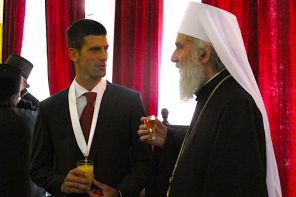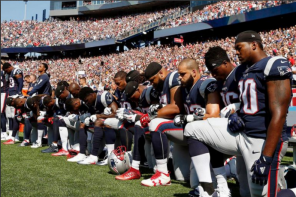With all the recent talk about Tim Tebow, few in the media have publicly acknowledged the real source of America’s fixation with the Broncos’ quarterback, his faith, and his successes and failures on the football field. The issue driving Tebow fever is not, as many claim, the appropriateness of on-field public displays of faith. While Tebow has elevated public religiosity among modern athletes to another level, the practice isn’t exactly new. It’s been around at least as long as Muhammad Ali’s conversion to Islam. For a lot of people, the intrigue with Tebow is less about appropriate on-field manners, and more about theology. People are watching because for many, his games are about whether or not a God exists who intervenes in human history—even in the mundane, like football.
If Tim Tebow won four games this season, no one would be particularly concerned with his religiosity. Sure it would get some press, but nothing like the phenomenon going on now. Conversely, if Tebow was a first-rate quarterback (which nearly all the “experts” claim he’s not), and the Broncos had the best record in football, the interest wouldn’t be at this level either. Kurt Warner was very open about his evangelical Christianity, and was a really good quarterback—even winning the Super Bowl—but his games weren’t breaking viewing records.
People are watching The Tebow Show because he’s a second-rate quarterback… and winning games, often against great odds while playing his best at the most opportune times. For a large segment of the population (43 percent according to a recent poll), Tebow’s success is proof that God intervenes in history, even in football games. For these people of faith, particularly evangelical Christians, it’s completely reasonable that God would intervene on Tebow’s behalf. Doesn’t God reward faith? Lord knows Tebow has faith. Why wouldn’t God make Tebow successful in order to demonstrate that faith matters, and that something positive can come from it? Why wouldn’t God allow Tebow to throw for exactly 316 yards, for a 31.6 yard passing average, with a 31.6 television rating at the end of the game, a game where Tebow had John 3:16 written under his eyes? Many people of faith believe they see God’s intervening work in the world every day. They watch Tebow because they know a miracle when they see it, and with him, they’ve seen it a lot.
On the other end of the spectrum are those who don’t believe God exists, or don’t believe God gives a hoot about football. These people watch because they want to see Tebow fail, and with it the faith that an active God routinely intercedes in human endeavors. These people aren’t just rooting against Tebow, they’re rooting against what they perceive is sheer ignorance and superstition.
And between these two ends of the spectrum are those who don’t know if God is helping Tebow, but want to believe he is. There’s a lot of angst in our country today—uncertainty about the economy, environment, politics, and international stability—and many people simply want to believe God is paying attention and capable and willing to offer a hand. If God can help a faithful quarterback win games, surely he can help a faithful nation free itself from its seemingly intractable problems; or a faithful person find a job, have children, survive cancer, etc. These people root for Tebow because his success keeps their hope and optimism alive. His victories are victories over the dreadful limits of human existence.
The theological question is the elephant in the living room. TV and radio commentators can’t ask their viewers and listeners if they think God is helping Tebow. Instead they ask tangential questions about whether his displays of faith are appropriate, or whether he’s being discriminated against because of his faith, or if he would be treated differently if he was a Muslim. But these questions are not driving the attention. What’s driving it is a real life, prime-time weekly test of the existence and nature of God. And people are tuning in.




